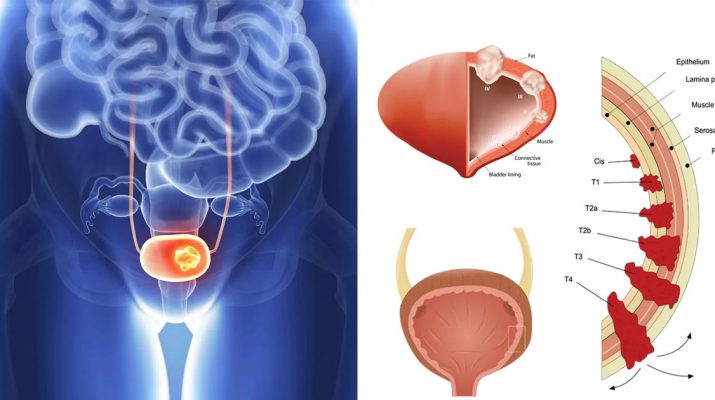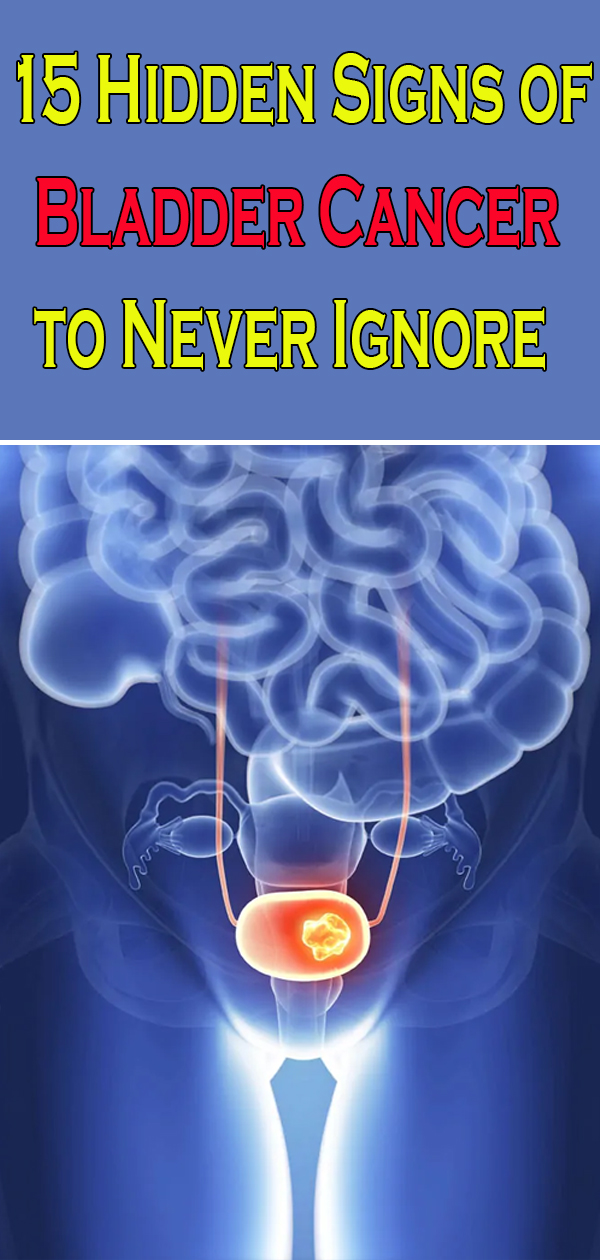Bladder cancer is, as its name suggests, a type of cancer that affects your bladder. The bladder is an organ that stores urine in the body, and it is located in the pelvis, where it rests slightly behind and above your pubic bone. It is responsible for 80,400 patient cases in America alone on an annual basis, making it one of the more common cancers that someone can experience.
Bladder cancer begins within the cells along your bladder lining, which slowly grow until they become tumorous. But how can you tell if you’re at risk of developing this disease?
Here Are 15 Hidden Signs Of Bladder Cancer To Never Ignore
-
Swollen Feet
Swollen feet in bladder cancer typically only occur in late stages. This happens when cancer has already begun to spread to a variety of other spots in the body, including the feet. This means that your feet may be infected with cancer by this point, causing them to form lumps or collect fluid.
Do note that swollen feet are also a common symptom of kidney cancer as well as bladder cancer. The metastasization of cancer to various body parts is typically the cause behind this symptom in almost all forms of cancer that it is applicable to.
-
Blood In Urine
The most obvious and clear sign of bladder cancer – and, luckily, one of the first symptoms – is bloody urine. You may see bloody streaks, clots, or discoloration in your urine when using the bathroom.
The good news is that this is among the first signs, meaning it is seen in very early stages of bladder cancer which can be treated more easily, so keep your positive thinking. Do note, though, that even if you don’t have bladder cancer, urine that has blood in it is always a cause for concern and should prompt you to see a doctor immediately.
-
Pelvic Pain
Considering the location of your bladder and what it is responsible for, it’s not unlikely that you’ve already figured out where the main area of pain will be for bladder cancer: your pelvis. Your pelvic area makes up the spots around your lower stomach, abdomen, and groin.
Any pain in this general area can be a sign of potential bladder cancer. However, it can also be a sign of other issues of varying severity. It can refer to:
- Stomach problems
- Bowel disease
- Reproductive troubles
- Menstrual issues
- STDs
- Kidney stones
Even if you don’t believe that it is serious, speak to your doctor if you experience prolonged pelvic pain.
-
Your Uti Won’T Stop
UTIs, or urinary tract infections, are very commonly developed in women. Many women are probably fairly used to developing UTIs due to how easily it can happen to them. As such, UTIs do not necessarily point to bladder cancer, although positive links have been drawn between them.
However, if your UTIs repeatedly return again and again, or if the infection never goes away even with antibiotics, there’s a good chance that your bladder may be the one to blame. In fact, women actually experience bladder cancer more frequently than ovarian cancer, even though they are at lower risk than men for the former!
-
Fatigue
Fatigue is a common symptom that is part and parcel of many types of cancer. This is because cancer can lead to pain, a lack of proper organ function, and increased attempts by your body to fight the diseases. However, fatigue usually shows up in the later stages of cancer.
But this isn’t just ordinary tiredness. You may feel so fatigued that you:
- Cannot get up at all
- Are unable to carry out everyday tasks
- Cannot sustain relationships
- Lose all positive thinking
- Are still exhausted after long rest periods
Of course, fatigue can be a symptom of many, many other kinds of issues. A large majority of them are not actually fatal. However, if you do deal with extreme levels of fatigue, speaking to a doctor can help you combat the issue.
-
Loss Of Appetite
Like with most other symptoms on our list, losing your appetite does not automatically point to bladder cancer. But you can definitely feel too weak to eat, or just lose your interest in food altogether, because your body is sick and unable to work up an appetite.
A loss of appetite is fairly common among cancer symptoms, and the further along each cancer progresses, the more likely you are to be disinterested in regular meals. Naturally, though, there are plenty of other less serious reasons for appetite loss, so don’t be too quick to jump the gun to the worst conclusion.
-
Darkened Urine
We’ve already talked about how blood in your urine could be a sign of bladder cancer – or just a sign that it’s time to go to a doctor in general. But sometimes, blood in your urine doesn’t show itself so obviously. You may not actually see anything bright red in your toilet bowl, causing you to overlook obvious symptoms.
Urine that has blood in it may actually just simply darken in color instead of becoming blood red. It may resemble the color of rust or simply look a little brown or darker than usual. In general, seeing a doctor about any changes in your urine is a good idea.
-
Slowed Or Reduced Urine Flow
Urinating is supposed to feel natural and come easily. You’re not supposed to have to sit down for prolonged periods of time just to get anything to flow out. If you try to urinate but wind up with very little or very slow urine flow, even when you really feel like you need to use the bathroom, you may be dealing with a bladder issue.
If you have been having difficulty urinating or have a weaker stream than usual, it’s a good idea to ask a medical professional for a check-up. Many bladder issues can lead to this problem.
-
A Complete Inability To Urinate
If bladder cancer has developed to an advanced stage, there is a chance that it will completely prevent you from urinating at all. Your bladder may be so blocked by cancer cells that are spreading across your body that urine can no longer exit your body.
Regardless of the cause behind it, a total inability to urinate is a very, very serious condition. You must see a medical professional as soon as possible in order to avoid potentially severe problems.
-
Urinating Causes Burning Discomfort
Urination isn’t supposed to be a painful process. If you experience discomfort when you urinate, it could be a sign of bladder cancer. You may experience issues such as:
- A burning sensation when you try to use the bathroom
- Straining in order to start a urine flow
- Mild to significant pain when you use the bathroom
- A sudden and acute change in urination habits and discomfort
The body naturally urinates to expel waste. Experiencing pain while you do so is not normal and is something you need to discuss with a doctor.
-
Urinary Incontinence
We’ve talked a lot about having difficulty urinating and its links to bladder cancer, but urinary incontinence – meaning an inability to hold in urine – can be just as bad a sign of an issue as anything else. In fact, it’s often a much clearer sign that something is wrong.
It’s not uncommon to deal with incontinence as you age, but even if you’re in your senior years, you should speak to your doctor if you’ve been dealing with this problem. If you’re young, you should definitely see a doctor as soon as possible in order to discover the cause of this problem.
-
Lower Back Pain
Similarly to pelvic pain, lower back pain occurs during the middle or later stages of bladder cancer. Typically, you will feel this pain manifest after the cancer has begun to spread to other parts of the body. The pain can feel only somewhat mild, like a simple discomfort, but it can also range all the way up to feeling extremely devastating.
Lower back pain is a very common general illness symptom and can be a sign of many different conditions. However, you should pay extra attention to constant pain that occurs on one side of the body.
-
Bone Pain
Once again, this is a kind of pain that starts to manifest more and more as the bladder cancer spreads outwards. You may feel aches and pains in your bones as the cancer begins to affect various parts of your body.
If bladder cancer is the cause behind widespread bone pain throughout your entire body, the cancer is in a very advanced stage. Luckily, many kinds of bone pain are not directly related to cancer, so don’t panic yet and keep your positive thinking on!
-
You Feel Like You Need To Urinate Often
You may find yourself needing to run to the bathroom a lot more often than usual, and the feeling that accompanies it is very urgent. One moment you feel fine, and the next you feel like you’re about to burst. You may wake up often at night to go to the toilet, interrupting your ability to get any rest at all.
Worse still, you may rush to the nearest restroom, only to sit down and be unable to urinate, or have barely any urine to get rid of. These issues combined are cause for concern and should be checked out by a doctor.
-
Weight Loss
It’s common to lose weight while you’re undergoing cancer treatment, but even the cancer on its own can cause weight loss. Because many people consider weight loss to be a good thing, they forget that it’s just as much of a warning sign as sudden weight gain is – if not more so.
A combination of a lack of appetite and a lack of energy can contribute to weight loss in cancer patients, but there are many other reasons the pounds may be dropping off. If you notice a sudden drop in weight, speak to a doctor about your concerns.
Final Thoughts On Some Hidden Signs Of Bladder Cancer To Never Ignore
Just like with all other cancer types, bladder cancer causes a variety of symptoms. But just because you have one or two of those symptoms, it doesn’t mean that you’re necessarily dealing with cancer. Many of these symptoms can be caused by other conditions, and some are even harmless on their own.
Still, it’s a good idea to speak to your doctor about any concerns you may have regarding any symptoms you notice. This is especially true if you have a large number of these symptoms all at once. It’s better to be safe than sorry!


